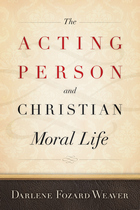
What may we say about the significance of particular moral actions for one’s relationship with God? In this provocative analysis of contemporary Catholic moral theology Darlene Fozard Weaver shows the person as a moral agent acting in relation to God. Using an overarching theological context of sinful estrangement from and gracious reconciliation in God, Weaver shows how individuals negotiate their relationships with God in and through their involvement with others and the world.
Much of current Christian ethics focuses more on persons and their virtues and vices exemplified by the work of virtue ethicists or on sinful social structures illustrated in the work of liberation theologians. These judgments fail to appreciate the reflexive character of human action and neglect the way our actions negotiate our response to God. Weaver develops a theologically robust moral anthropology that advances Christian understanding of persons and moral actions and contends we can better understand the theological import of moral actions by seeing ourselves as creatures who live, move, and have our being in God.
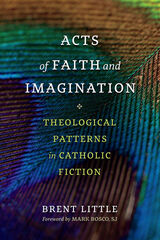

Roman Catholic moral theology is the point of departure for this multifaceted exploration of the challenge of allocating scarce medical resources.
The volume begins its exploration of discerning moral limits to modern high-technology medicine with a consensus statement born of the conversations among its contributors. The seventeen essays use the example of critical care, because it offers one of the few areas in medicine where there are good clinical predictive measures regarding the likelihood of survival. As a result, the health care industry can with increasing accuracy predict the probability of saving lives—and at what cost.
Because critical care involves hard choices in the face of finitude, it invites profound questions about the meaning of life, the nature of a good death, and distributive justice. For those who identify the prize of human life as immortality, the question arises as to how much effort should be invested in marginally postponing death. In a secular culture that presumes that individuals live only once, and briefly, there is an often-unacknowledged moral imperative to employ any means necessary to postpone death. The conflict between the free choice of individuals and various aspirations to equality compounds the challenge of controlling medical costs while also offering high-tech care to those who want its possible benefits. It forces society to confront anew notions of ordinary versus extraordinary, and proportionate versus disproportionate, treatment in a highly technologically structured social context.
This cluster of discussions is enriched by five essays from Jewish, Orthodox Christian, and Protestant perspectives. Written by premier scholars from the United States and abroad, these essays will be valuable reading for students and scholars of bioethics and Christian moral theology.
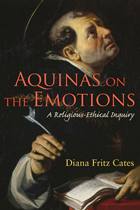
All of us want to be happy and live well. Sometimes intense emotions affect our happiness—and, in turn, our moral lives. Our emotions can have a significant impact on our perceptions of reality, the choices we make, and the ways in which we interact with others. Can we, as moral agents, have an effect on our emotions? Do we have any choice when it comes to our emotions?
In Aquinas on the Emotions, Diana Fritz Cates shows how emotions are composed as embodied mental states. She identifies various factors, including religious beliefs, intuitions, images, and questions that can affect the formation and the course of a person's emotions. She attends to the appetitive as well as the cognitive dimension of emotion, both of which Aquinas interprets with flexibility. The result is a powerful study of Aquinas that is also a resource for readers who want to understand and cultivate the emotional dimension of their lives.
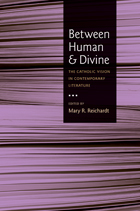
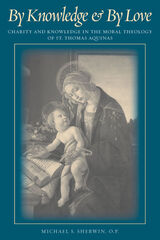
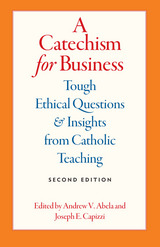
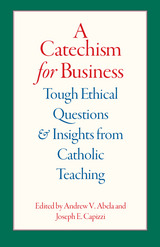

Starting where Max Weber's The Protestant Ethic and the Spirit of Capitalism left off, John E. Tropman develops the idea that there is another religious-based ethic permeating society, a Catholic ethic. Where Weber proposed that a Protestant ethic supported the development of capitalism, Tropman argues that there is a Catholic ethic as well, and that it is more caring and community-oriented.
Weber's notion of the Protestant ethic has become widely accepted, but until Tropman's work, beginning in the mid-1980s, there had been no discussion of another, religious-based ethic. He suggests that if the Protestant ethic is an "achievement" ethic, the Catholic ethic is a "helping" one. Tropman outlines a Catholic ethic that is distinctive in its sympathy and outreach toward the poor, and in its emphasis on family and community over economic success. This book fully explores the Catholic ethic and its differing focus by using both historical and survey research. It also points to the existence of other religious-based ethics.
This clearly written book, employing the tools of both sociology and religious thought, will appeal to a wide audience, including students and scholars in disciplines informed by the influence of religion on politics and on social and economic behavior.

In this magisterial volume Charles E. Curran surveys the historical development of Catholic moral theology in the United States from its 19th century roots to the present day. He begins by tracing the development of pre-Vatican II moral theology that, with the exception of social ethics, had the limited purpose of training future confessors to know what actions are sinful and the degree of sinfulness.
Curran then explores and illuminates the post-Vatican II era with chapters on the effect of the Council on the scope and substance of moral theology, the impact of Humanae vitae, Pope Paul VI's encyclical condemning artificial contraception, fundamental moral theology, sexuality and marriage, bioethics, and social ethics.
Curran's perspective is unique: For nearly 50 years, he has been a major influence on the development of the field and has witnessed first-hand the dramatic increase in the number and diversity of moral theologians in the academy and the Church. No one is more qualified to write this first and only comprehensive history of Catholic moral theology in the United States.

The Catholic tradition has always tried to explain its theology in a coherent and systematic way, but the great changes and tensions existing within Catholic moral theology today have made it difficult to develop systematic approaches to what was once called fundamental moral theology. Now a leading scholar active in this field for forty years offers a synthesis of Catholic moral theology set in the context of the broader Catholic tradition and the significant developments that have occurred since the Second Vatican Council.
Charles E. Curran’s succinct, coherent account of his wide-ranging work in Catholic moral theology points out agreements, disagreements, and changes in significant aspects of the Catholic moral tradition. His systematic approach explores major topics in a logical development: the ecclesiological foundation and stance of moral theology; the person as moral subject and agent; virtues, principles and norms; conscience and decision making; and the role of the church as a teacher of morality.
Curran’s work condenses and organizes a large amount of material to show that the Catholic theological tradition is in dialogue with contemporary life and thought while remaining conscious of its rich history. Of great interest to theologians for its broad synthetic scope, this book is also a thorough introduction to the Catholic moral tradition for students and interested readers, including non-Catholics.


In this third collection of his essays on Christian ethics, Josef Fuchs takes up a number of pressing questions both in fundamental and applied ethics.
Several essays explore the biblical basis for establishing Christian norms and principles for ethical decision-making. These deal in detail with th enature of human conscience and the effect on it fo religious values in a pluralistic culture. The author also deals with current and pressing issues of a Christian moral life: continuity and change in moral teaching as exemplified by the debate over religious freedom; pluralism in the understanding of Christian marriage as early as the twelfth century; bioethical problems dealing with the beginning and end of human life; and the general question, is there a "Catholic" ethical moral theology?
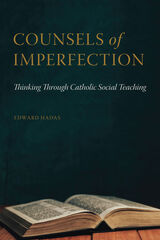

When Richard A. McCormick's The Critical Calling was first published, Andrew M. Greeley commented that "in years to come scholars will look back on Father McCormick's work and say, 'This was a man who knew what he was talking about!'" In this reissue, with a new foreword by Lisa Sowle Cahill, both first-time readers and those opening the pages for a return visit with an honored friend will find Greeley's characterization remains valid.
Father McCormick begins The Critical Calling with his personal affirmation of the work of Vatican II: "I believe the Council was a work of the Spirit—desperately needed, divinely inspired, devotedly and doggedly carried through." Yet, he stresses this was no uncritical endorsement of everything the Council did and said. Part One includes a discussion of fundamental moral theology that looks at the relationship between the church hierarchy and individual moral decision making and several chapters addressing issues precipitated by actions involving Cardinal Josef Ratzinger, now Pope Benedict XVI. Part Two focuses on practical and pastoral questions that touch on contemporary concerns ranging from abortion to AIDS, divorce, homosexuality, and teenage sexuality.
Cahill suggests that "those who lived through the tumultuous 1960s and '70s" as well as "those who came to maturity after the Council" will find this book to be an accurate and evocative reflection of the passions that imbued all those early debates and a helpful explanation why those passions ran so high. All readers will benefit from the wise insights into the controversies of that era and the more recent struggles, challenges, and debates that confront today's church.
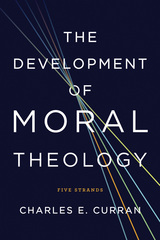
Charles Curran in his newest book The Development of Moral Theology: Five Strands, brings a unique historical and critical analysis to the five strands that differentiate Catholic moral theology from other approaches to Christian ethics—sin and the manuals of moral theology, the teaching of Thomas Aquinas and later Thomists, natural law, the role of authoritative church teaching in moral areas, and Vatican II. Significant changes have occurred over the course of these historical developments. In addition, pluralism and diversity exist even today, as illustrated, for example, in the theory of natural law proposed by Cardinal Ratzinger.
In light of these realities, Curran proposes his understanding of how the strands should influence moral theology today. A concluding chapter highlights the need for a truly theological approach and calls for a significant change in the way that the papal teaching office functions today and its understanding of natural law.
In a work useful to anyone who studies Catholic moral theology, The Development of Moral Theology underscores, in the light of the historical development of these strands, the importance of a truly theological and critical approach to moral theology that has significant ramifications for the life of the Catholic church.

In Charles E. Curran’s latest book, Diverse Voices in Modern US Moral Theology, he presents the diverse voices of US Catholic moral theologians from the mid-twentieth century to the present. The book discusses eleven key individuals in the development and evolution of moral theology as well as the New Wine, New Wineskins movement. This diversity, which differs from the monolithic understanding of moral theology that prevailed until recently, comes from the diverse historical circumstances or Sitz im Leben of the authors. Each of these theologians developed her or his approach in light of these circumstances and in response to shifts in the three audiences of moral theology—the Church, the academy, and the broader society.
By exploring this diversity, Curran recognizes the deep divisions that exist within Catholic moral theology between the so-called “liberal” and “conservative” approaches and acknowledges the need for greater dialogue between them, providing a deeper understanding of the methods and approaches of these significant figures.
This new book from a major figure in the field will be an important resource for students and scholars of US Catholic moral theology and for anyone seeking to understand the current state of moral theology in America today.
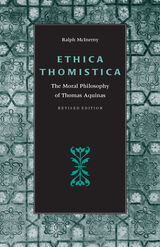


In the wake of the successful cloning of animals and the promises—or fears—of stem cell research, new discoveries in science and medicine need more than ever to be accompanied by careful moral reflection. Contending that concern over the ethical dimensions of these and other like issues are no longer just in the domain of those involved in medical practice, the third edition of Ethics of Health Care claims these are vital topics that should matter deeply to all citizens.
While stressing the Catholic tradition in health care ethics, Ethics of Health Care is ecumenical, incorporating a broader Christian tradition as well as humanistic approaches, and takes as common ground for mutual understanding the Universal Declaration of Human Rights of the United Nations. This new third edition is a response to the many developments in theology and the startlingly rapid changes in the arenas of medicine and health care over the past decade, from the dominance of managed care to increased surgery on an "outpatient" basis; from hospice care for the dying to the increasing use of drugs in the treatment of mental illness.
Revised and thoroughly up-to-date, this third edition continues with its valuable teaching aids, including case studies, study questions, chapter summaries, a bibliography, and complete index.
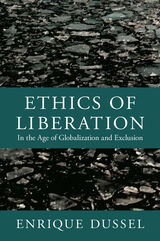
Throughout his career, Dussel has sought to open a space for articulating new possibilities for humanity out of, and in light of, the suffering, dignity, and creative drive of those who have been excluded from Western Modernity and neoliberal rationalism. Grounded in engagement with the oppressed, his thinking has figured prominently in philosophy, political theory, and liberation movements around the world.
In Ethics of Liberation, Dussel provides a comprehensive world history of ethics, demonstrating that our most fundamental moral and ethical traditions did not emerge in ancient Greece and develop through modern European and North American thought. The obscured and ignored origins of Modernity lie outside the Western tradition. Ethics of Liberation is a monumental rethinking of the history, origins, and aims of ethics. It is a critical reorientation of ethical theory.
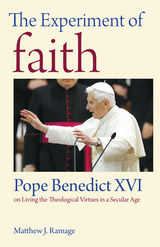
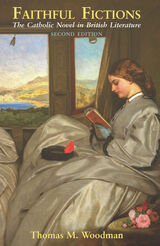
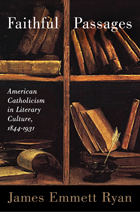
Faithful Passages also reveals new dimensions in American religious literary culture by moving beyond the antebellum period to consider how the first important cohort of Catholic writers shaped their message for subsequent generations of readers in the late nineteenth and early twentieth centuries. Perhaps most strikingly, Ryan shows that by the early twentieth century, Roman Catholic themes and traditions in American literature would be advanced in complex ways by mainstream, non-Catholic modernist writers like Kate Chopin and Willa Cather.
Catholic literary culture in the United States took shape in a myriad of ways and at the hands of diverse participants. The process by which Roman Catholic ideas, themes, and moralities were shared and adapted by writers with highly differentiated beliefs, Ryan contends, illuminates a surprising fluidity of religious commitment and expression in early U.S. literary culture.
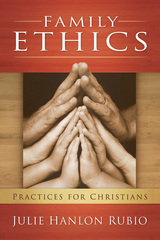
How can ordinary Christians find moral guidance for the mundane dilemmas they confront in their daily lives? To answer this question, Julie Hanlon Rubio brings together a rich Catholic theology of marriage and a strong commitment to social justice to focus on the place where the ethics of ordinary life are played out: the family.
Sex, money, eating, spirituality, and service. According to Rubio, all are areas for practical application of an ethics of the family. In each area, intentional practices can function as acts of resistance to a cultural and middle-class conformity that promotes materialism over relationships. These practices forge deep connections within the family and help families live out their calling to be in solidarity with others and participate in social change from below. It is through these everyday moral choices that most Christians can live out their faith—and contribute to progress in the world.

The Global Face of Public Faith addresses the hotly debated question of the role religion should play in politics in both the American and international contexts. It engages the fears that public religion threatens American democracy and could lead to a global clash of civilizations and new wars of religion. It analyzes how Christianity can attain common ground with other religious communities, thus becoming a force for peace and human rights. The separation of church from state need not mean the privatization of religion. Religious engagement in public life can strengthen civic life by encouraging active citizen participation that promotes both justice and peace. The question of religion and politics should thus become an argument about how faith becomes public, not whether it does. Religious communities, Christianity in particular, should be vigorous advocates of human rights, democratic governance, and economic development worldwide. In so doing, they will also become peacemakers.
David Hollenbach is a calm voice of reason in a chaotic world, with an eye that sees beyond national horizons to where human needs and human rights converge. He is convinced that religious traditions can find common ground—through the use of rights and rights language. The Global Face of Public Faith reinforces his commitment to confronting such issues as poverty and economic development, globalism, and interreligious dialogue. He focuses here on faith and the Catholic tradition in politics; the role of the church in American public life; and the wider issues of global challenges and ethics—in a search for a common set of moral standards and a international ethic through a commitment to universal human rights. While not denying the difficulties of forging such a consensus, he nonetheless sees the possibility for justice, and reasons for hope. And hope is something the world can always use.

This appraisal of two of the most fundamental terms in the moral language of Thomas Aquinas draws on the contemporary moral distinction between the goodness of a person and the rightness of a person's living. Keenan thus finds that Aquinas's earlier writings do not permit the possibility of such a distinction. But in his mature works, specifically the Summa Theologiae, Thomas describes the human act of moral intentionality, and even the virtues in a way analogous to our use of the term moral rightness. To Thomas, only the virtue of charity expresses moral goodness. And, although Thomas describes vices and sin as wrong conduct, he never really develops a description for moral badness.Keenan compels us to carefully examine Thomas's central moral concepts and to measure them against contemporary standards for meaning and correctness. As a result, any student of Thomas will find here a forceful argument that his notion of the good is considerably different from ours. Similarly, ethicists and moral theologians will find in the Thomas presented here a consistent-virtue ethicist concerned with descriptions for right living. Any student of theology will also find here a Thomas whose critical and concrete thinking enabled him to develop and even abandon earlier positions as his comprehension of the Good evolved.
This analysis prompts a re-examination of our own concepts. Measuring Thomas's standards against our own, Keenan obliges us to ask whether we sufficiently understand rightness and moral intentionality. He also asks whether we correctly describe what it means to will or to desire something. He further questions whether we have surrendered our understanding of the virtues to the voluntarism and subjectivism which Thomas relentlessly critiqued. This historically sophisticated reading of the Summa Thologiae both allows Thomas to speak again as he once did, and affords us the chance to evaluate the way we describe ourselves and one another as being good and living rightly.

Garth L. Hallett provides the first thorough, systematic exposition and defense of proportionalism in Christian ethics. Prominent in both philosophical and theological ethics, proportionalism judges the morality of acts by their proportion of good and evil.
Hallett proposes judging acts using a norm he calls Value Maximization. He defines this norm and offers a full response to such critics of all forms of proportionalism as Finnis and Grisez. The author assesses the norm's moral and theological validity in and of itself; in dialogue with the encyclical Veritatis Splendor; and in comparison with various rival viewpoints, stressing natural law, divine commands, respect for persons, inviolable goods, proportionate ends, irreducible rights, and agent-centered ethics. He appraises the norm's overall significance, showing its rootedness in Christian tradition, its inclusiveness and amplitude, and its relevance to those seeking a foundation for Christian ethical thought and moral activity.
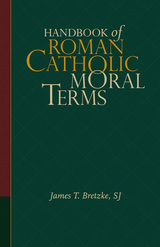
The Handbook of Roman Catholic Moral Terms contains more than 800 moral terms, offering concise definitions, historical context, and illustrations of how these terms are used in the Catholic tradition, including Church teaching and documents.
James T. Bretzke, SJ, places Catholic tradition in a contemporary context in order to illuminate the continuities as well as discontinuities of Church teaching and key directions of Catholic thought. The author also provides extensive cross-referencing and bibliographic suggestions for further research.
Designed to serve as a vital reference work for libraries, students and scholars of theology, priests and pastoral ministers, as well as all adults interested in theological enrichment or continuing education, the Handbook of Roman Catholic Moral Terms is the most comprehensive post–Vatican II work of its kind available in English.

What, exactly, does it mean to be human? It is an age-old question, one for which theology, philosophy, science, and medicine have all provided different answers. But though a unified response to the question can no longer be taken for granted, how we answer it frames the wide range of different norms, principles, values, and intuitions that characterize today's bioethical discussions. If we don't know what it means to be human, how can we judge whether biomedical sciences threaten or enhance our humanity?
This fundamental question, however, receives little attention in the study of bioethics. In a field consumed with the promises and perils of new medical discoveries, emerging technologies, and unprecedented social change, current conversations about bioethics focus primarily on questions of harm and benefit, patient autonomy, and equality of health care distribution. Prevailing models of medical ethics emphasize human capacity for self-control and self-determination, rarely considering such inescapable dimensions of the human condition as disability, loss, and suffering, community and dignity, all of which make it difficult for us to be truly independent.
In Health and Human Flourishing, contributors from a wide range of disciplines mine the intersection of the secular and the religious, the medical and the moral, to unearth the ethical and clinical implications of these facets of human existence. Their aim is a richer bioethics, one that takes into account the roles of vulnerability, dignity, integrity, and relationality in human affliction as well as human thriving. Including an examination of how a theological anthropology—a theological understanding of what it means to be a human being—can help us better understand health care, social policy, and science, this thought-provoking anthology will inspire much-needed conversation among philosophers, theologians, and health care professionals.

This fourth edition of Health Care Ethics provides a contemporary study of broad and major issues affecting health care and the ethics of health care from the perspective of Catholic teachings and theological investigation.
It aims to help Christian, and especially Catholic, health care professionals solve concrete problems in terms of principles rooted in Scripture and tested by individual experience.
Since the last edition of Health Care Ethics, there have been many changes in the fields of health care medicine and theology that have necessitated a fourth edition. Ashley and O'Rourke have revised their seminal work to address the publication of significant documents by the Church and the restructuring of the health care system.
Features of the revised fourth edition:
• Discusses significant Church documents issued since the third edition includes "The Splendor of Truth" (Veritatis Splendor), and the "Gospel of Life" (Evangelium Vitae); the "Instruction on the Vocation of Theologians"; the Catechism of the Catholic Church; and the Revised Ethical and Religious Directives for Catholic Health Services.
• Examines the implications of managed care techniques.
• Probes such changes in the practice of medicine as the new emphasis on preventive care, the involvement of individuals in their own care, greater use of pharmaceuticals in psychiatry, and the greater role of genetics in diagnosis and prognosis.
• Explores the quest for more compassionate care of the dying.
• Updates the bibliography.

Poorman brings together ethics and pastoral practice in an interactional model that captures the distinctive character of Christian pastoral counseling. His work is especially important in a culture that often confuses pastoral counseling with therapy. It also challenges traditional notions which portray the pastoral minister as an instructor who dispenses the church's moral teaching. Poorman distinguishes the pastoral task from that of therapist or teacher, while drawing on the best resources of contemporary psychology and moral development theories. he brings moral theology into lively conversation with pastoral experience; at the same time, his clear presentation brings a critical method of moral discernment to Christian ministry which is rooted in faith and the wisdom of the community.

John Cuthbert Ford, SJ (1902-1989) was one of the leading American Catholic moralists of the 20th century. This is the first full-length analysis of his work and influence, one that not only reveals a traditionally Catholic method of moral analysis but also illuminates the conflicts behind and development of Catholic moral teaching during the volatile 1960s.
Ford is best known for his influential contribution to Catholic teachings on three moral issues. His objection to the Allied practice of obliteration bombing during WWII by drawing a sharp distinction between combatants and noncombatants is still studied widely today. Ford campaigned for alcohol education for both clergy and laity and introduced a pastoral approach for assisting and counseling alcoholics. As a member of the Papal Commission on Population, Family, and Birth Rate during the 1960s, Ford was an unyielding defender of the traditional Catholic teaching on birth control that still reigns today.
Drawing on the published works and personal papers of Ford, Eric Genilo begins with a brief description of the theologian's life, career, and influence. The book is divided into two parts. In Part I, Method, Genilo offers an overview of Ford's moral theology in the "manualist" tradition—a 300-year period during which Catholic priests used manuals to instruct the faithful on matters of morality and sin. Genilo then examines Ford's two modes of resolving moral cases and presents Ford's approach to doctrinal development. In Part II, Moral Objectivity, Genilo shows how Ford confronted the growing situation ethics movement, then moves to how he understood freedom and subjective culpability, particularly in the case of alcoholism. Later chapters reveal Ford's theological conflicts with Josef Fuchs, SJ on the issue of birth control, his staunch opposition to totalitarianism, and his moral analysis of how society should treat marginalized persons threatened by the abuse of power.
Genilo concludes with an assessment of Ford's legacy to the development and practice of moral theology, leaving the reader with an in-depth portrait of an extraordinary man who dedicated his life to defending the Church and protecting the most vulnerable persons in society.
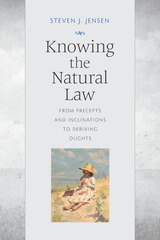
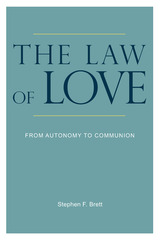
With an interdisciplinary combination of philosophy, theology, and family law, The Law of Love explores the impact of secular conceptions of autonomy on sexuality and family. Drawing from the thought of Aristotle, Cicero, Augustine, Aquinas, and the modern theologian Servais Pinckaers, Stephen F. Brett argues that the divorce of freedom from virtue has caused cultural relativism, and that a potent and healthy mix of temperance, chastity, and modesty is the antidote. Styled accessibly and quite cleverly with a broader audience in mind, The Law of Love will appeal to intellectuals of all faiths who are interested in facing the ambiguities and problems of contemporary life in a secularized society.
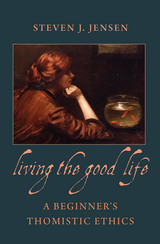
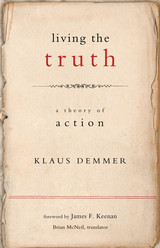
How is moral theology related to pastoral theology? In this first English translation of Living the Truth, Klaus Demmer answers this question by offering a complete theory of action. Its crucial element is truthfulness, which Demmer claims is a basic attitude that must be translated concretely into our individual decisions. Demmer demonstrates that the demand for truthfulness offers a critical corrective to the usual praxis whereby ethical norms are formulated. This has significant consequences for every area of ethical directives, including questions about celibacy and partnerships.
Demmer moves away from the act-centered morality that dominates the neo-Scholastic manuals of moral theology. His concern is to show how our actions embody and carry out a more original anthropological project. Not only does this anthropological project condition our insights into goods and values, it provides the criteria by which our actions are judged morally. This book will be welcomed by all who are looking for ethical norms, and by all whose task it is to formulate such norms.
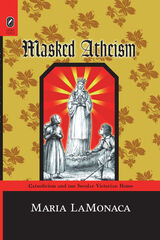
Why did the Victorians hate and fear Roman Catholics so much? This question has long preoccupied literary and cultural scholars alike. Masked Atheism: Catholicism and the Secular Victorian Home by Maria LaMonaca begins with the assumption that anti-Catholicism reveals far more about the Victorians than simple theological disagreements or religious prejudice. An analysis of anti-Catholicism exposes a host of anxieties, contradictions, and controversies dividing Great Britain, the world’s most powerful nation by the mid-nineteenth century.
Noting that Catholicism was frequently caricatured by the Victorians as “masked atheism”—that is, heathenism and paganism masquerading as legitimate Christianity—LaMonaca’s study suggests that much anti-Catholic rhetoric in Victorian England was fueled by fears of encroaching secularism and anxieties about the disappearance of God in the modern world. For both male and female writers, Catholicism became a synonym for larger, “ungodly” forces threatening traditional ways of life: industrialization, rising standards of living, and religious skepticism.
LaMonaca situates texts by Charlotte Brontë, George Eliot, Christina Rossetti, Elizabeth Barrett Browning, Michael Field, and others against a rich background of discourses about the growing visibility of Anglo and Roman Catholicism in Victorian England. In so doing, she demonstrates the influence of both pro- and anti-Catholic sentiment on constructs of Victorian domesticity, and explores how writers appropriated elements of Catholicism to voice anxieties about the growing secularization of the domestic sphere: a bold challenge to sentimental notions of the home as a “sacred” space. Masked Atheism will contribute a fresh perspective to an ongoing conversation about the significance of Catholicism in Victorian literature and culture.
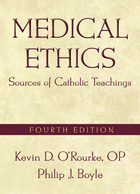
In a single convenient resource, this revised and updated edition of a classic text organizes and presents clearly the documents of the Catholic Church pertaining to medical ethics. Introductory chapters provide the context for interpreting the Church's teachings and theological values, guiding the reader in how to apply the teachings to particular ethical dilemmas and helping the reader to understand the role of conscience within the Catholic tradition.
The teaching of the Church in regard to health care ethics is pertinent not only for health care professionals and students, but for all who are concerned about the common good of society. Medical Ethics examines specific teachings of the Church on over seventy issues in clinical and research ethics, including abortion, AIDS, artificial insemination, assisted suicide, cloning, contraception, euthanasia, gene therapy, health care reform, organ donation and transplantation, organizational ethics, stem cells, surrogate motherhood, and withholding and withdrawing life support.
O'Rourke and Boyle bring this fourth edition up to the present day by incorporating recent papal documents regarding the social aspects of health care, assent to Church teaching, and the 2008 papal instruction Dignitas personae, an extremely influential document that illuminates such controversial dilemmas as prenatal adoption, frozen embryos, and genetic diagnosis.

In a single convenient resource, this book organizes and presents clearly the documents of the Catholic church pertaining to medical ethics. Introductory chapters provide the context for interpreting the Church's teachings and guide the reader in applying the teachings to particular ethical quandaries.
This third edition has been updated to incorporate the statements issued since the preparation of the second edition. The authors have revised the introductory chapters to include ideas from the papal encyclical Splendor Veritatis and "Instruction of the Ecclesial Vocation of the Theologian," published by the Vatican Congregation for the Doctrine of the Faith, concerning the various levels of the teachings of the Church. Other new statements included in this edition are relevant topics from the papal encyclical Evangelium Vitae (abortion, euthanasia, amniocentesis, suicide and withdrawing life support); the Vatican Congregation of Doctrine and Faith on uterine isolation; the U.S. bishops on the care of anencephalic infants, genetic testing, and cloning; and the Pennsylvania Catholic Conference on the treatment for rape in Catholic hospitals.
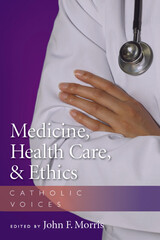
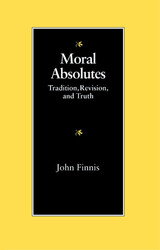

Comprehensive in its approach yet written in plain language, The Moral Bond of Community offers a biblically-based concept of Christian justice that can be applied to moral questions in everyday life.
Brady examines four forms of Christian moral discourse — narrative, prophetic, ethical, and policy — and shows how each contributes to a fuller understanding of Christian morality.

In this collection of recent essays (1988-92), all but one previously unavailable in English, noted theologian Josef Fuchs, SJ, examines key issues in normative morality. Identifying two strains, one based on natural law and a more situational one based on the Golden Rule, he explores the need for plurality in both individual and societal ethics, and the problem of universal versus only general validity. Central ideas that Fuchs develops are the concept of innovative morality as the individual's responsible search for God's will in personal situations; and the significance of the conscience in the face of official statements by the church's magisterium. Among the topics he considers are marriage and sexuality; the beginning and end of life; and international solidarity and social justice.
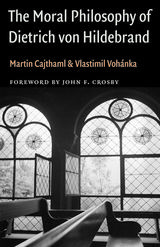

Pope John Paul II is the second longest serving pope in history and the longest serving pope of the last century. His presence has thrown a long shadow across our time, and his influence on Catholics and non-Catholics throughout the world cannot be denied. Much has been written about this pope, but until now, no one has provided a systematic and thorough analysis of the moral theology that underlies his moral teachings and its astonishing influence. And no one is better positioned to do this than Charles E. Curran, widely recognized as the leading American Catholic moral theologian.
Curran focuses on the authoritative statements, specifically the fourteen papal encyclicals the pope has written over the past twenty-five years, to examine how well the pope has addressed the broad issues and problems in the Church today. Curran begins with a discussion of the theological presuppositions of John Paul II's moral teaching and moral theology. Subsequent chapters address his theological methodology, his ethical methodology, and his fundamental moral theology together with his understanding of human life. Finally, Curran deals with the specific issues of globalization, marriage, conscience, human acts, and the many issues involved in social and sexual ethics.
While finding much to admire, Curran is nonetheless fiercely precise in his analysis and rigorously thoughtful in his criticism of much of the methodological aspects of the pope's moral theology—in his use of scripture, tradition, and previous hierarchical teaching; in theological aspects including Christology, eschatology, and the validity of human sources of moral wisdom and knowledge; and in anthropology, the ethical model and natural law. Brilliantly constructed and fearlessly argued, this will be the definitive measure of Pope John Paul II's moral theology for years to come.

Joseph Cardinal Bernardin of Chicago was for twenty years the most influential U.S. Catholic bishop; he was also a beloved public figure whose views commanded respect from Catholics and non-Catholics alike. This posthumous collection of a number of his major addresses on central moral issues in contemporary American life voices the causes that were closest to his heart: the sanctity and protection of all human life, the reshaping of American society and institutions for the benefit of the poorest, the preservation of peace in the pursuit of justice, and the growth of mutual understanding and harmony within the Church.
Spanning the period from the early 1980s to just weeks before his death in late 1996, these essays demonstrate a remarkably sustained and thoughtful effort to articulate an overall framework for moral decisions — "a consistent ethic of life" — and to affirm an active role for religious convictions in a pluralist democratic society. Cardinal Bernardin applies the Church’s moral and social teachings to complex policy issues in a way that respects religious freedom and invites both reflection from Catholics and dialogue with people of other beliefs.
Written in a clear and accessible style, this volume will be of value to everyone interested in Cardinal Bernardin’s moral vision for political choices. It will also be important for a wide range of readers concerned with in Christian ethics and the role of religion in the public sphere.
Joseph Cardinal Bernardin (1928-1996) served as the archbishop of Chicago from 1982 to 1996 and as archbishop of Cincinnati from 1972 to 1982. He was made a cardinal by Pope John Paul II in 1983 and received the Presidential Medal of Freedom in 1996 for his contribution to American civic life. He wrote The Gift of Peace (Loyola University Press, 1997).

Germain Grisez has been a leading voice in moral philosophy and theology since the Second Vatican Council. In this book, such major thinkers as John Finnis, Ralph McInerny, and William E. May consider issues in ethics, metaphysics, and politics that have been central to Grisez's work.
Grisez's reconsideration of the philosophical foundations of Christian moral teaching, seeking to eliminate both legalistic interpretation and theological dissent, has won the support of a number of leading Catholic moralists. In the past decade, moreover, many philosophers outside of Catholicism have weighed carefully Grisez's alternatives to theories that have long dominated secular moral philosophy.
This book presents a broad spectrum of viewpoints on subjects ranging from contraception to capital punishment and considers such controversies as the scriptural basis of Grisez's work his interpretations of Aquinas, and his new natural law theory. The collection includes not only contributions from Grisez's supporters but also from critics of his thought, from proportionalist Edward Collins Vacek, SJ, to the neo-Thomist Ralph McInerny. A reply by Grisez, written with Joseph M. Boyle Jr., addresses the issues and viewpoints expressed, while an afterword by Russell Shaw reviews Grisez's pioneering work and conveys a vivid sense of the philosopher's personality.
As Grisez's influence grows, this volume will serve as an important touchstone on his contributions to moral and political philosophy and theology.
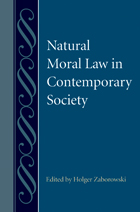
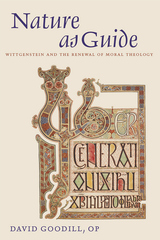

Charles E. Curran presents the first in-depth analysis of the origins of Catholic moral theology in the United States, focusing on three significant figures in the late nineteenth century and demonstrating that methodological pluralism and theological diversity existed in the Church even then.
Curran begins by tracing the historical development of moral theology, especially as presented in nineteenth-century manuals of moral theology, which offered a legal model of morality including a heavy emphasis on canon law. He then probes the different approaches and ideas of three important writers: Aloysius Sabetti, a Jesuit who was a typical, as well as the most influential, American manualist; Thomas J. Bouquillon, first chair of moral theology at Catholic University of America, a neoscholastic who criticized the manuals' approach as narrow and incomplete for failing to address principles, virtues, and the connection to systematic theology; and clerical educator John B. Hogan, a casuist who developed a more inductive and historically conscious methodology.
Curran describes how all three men dealt in different ways with the increasing role of authoritative teachings in moral theology from the Vatican. He also shows how they reflected their American context and the views of their own time on women and sexuality.
So little attention has been paid to the development of moral theology in this country that these authors are unknown to many scholars. Curran's book corrects this oversight and proposes that the ferment revealed in their writings offers important lessons for contemporary Catholic moral theology.
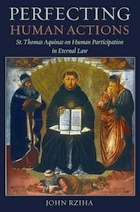
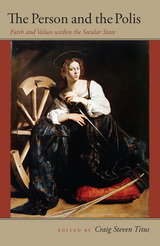

In this volume, Josef Fuchs has brought together 12 important essays which consider various aspects of the relationship between Christian morality and human behavior. Among the subjects he discusses are the connections between moral theology and Christian experience, the absolute character of moral norms, and the importance of ethical reflection in shaping the future of the human race.
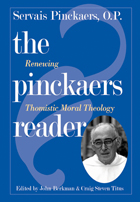
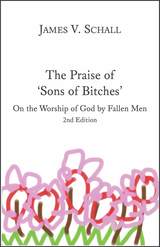
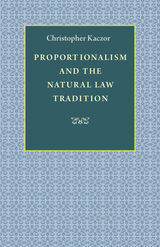

One of the most heated debates in recent times among Christian ethicians has been over what has come to be called "proportionalism." Opponents have argued that proportionalists are intent on relativizing theology norms and theh concept of intrinsic evil. Proponents, on the other hand, argue that they are merely developing a traditional notion of proportion of reason. Bernard Hoose puts this debate in context by showing its roots in the writings of European moral theologians and its flowering in the writings of their American colleagues. He uncovers a number of confusions that have bedeviled the argument while revealing how important the issues are for establishing in coherent Christian ethics in the twentieth century.

Although he is one of the most influential Catholic theologians in Europe, very few of Klaus Demmer's writings are available in English. This translation of his well-known work on moral theology introduces Demmer's thought to English-speaking audiences.
In an original synthesis of scholastic and continental philosophy, Demmer brings the Catholic moral tradition into conversation with contemporary philosophical schools—transcendental, hermeneutical, and analytical—to fashion a moral theology in the spirit of the Second Vatican Council. He shows the richness of the neoscholastic tradition in shaping and being shaped by our contemporary self-understanding.
A complete bibliography of Demmer's works will assist readers in seeking out more of his writings.
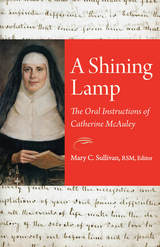

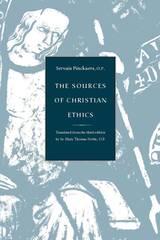

Winner of the 2022 Catholic Media Association Award in Theology
A new ethics for understanding the social forces that shape moral character.
It is easy to be vicious and difficult to be virtuous in today’s world, especially given that many of the social structures that connect and sustain us enable exploitation and disincentivize justice. There are others, though, that encourage virtue.
In his book Daniel J. Daly uses the lens of virtue and vice to reimagine from the ground up a Catholic ethics that can better scrutinize the social forces that both affect our moral character and contribute to human well-being or human suffering.
Daly’s approach uses both traditional and contemporary sources, drawing on the works of Thomas Aquinas as well as incorporating theories such as critical realist social theory, to illustrate the nature and function of social structures and the factors that transform them. Daly’s ethics focus on the relationship between structure and agency and the different structures that enable and constrain an individual’s pursuit of the virtuous life. His approach defines with unique clarity the virtuous structures that facilitate a love of God, self, neighbor, and creation, and the vicious structures that cultivate hatred, intemperance, and indifference to suffering. In doing so, Daly creates a Catholic ethical framework for responding virtuously to the problems caused by global social systems, from poverty to climate change.
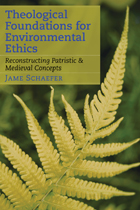
Earth is imperiled. Human activities are adversely affecting the land, water, air, and myriad forms of biological life that comprise the ecosystems of our planet. Indicators of global warming and holes in the ozone layer inhibit functions vital to the biosphere. Environmental damage to the planet becomes damaging to human health and well-being now and into the future—and too often that damage affects those who are least able to protect themselves.
Can religion make a positive contribution to preventing further destruction of biological diversity and ecosystems and threats to our earth? Jame Schaefer thinks that it can, and she examines the thought of Christian Church fathers and medieval theologians to reveal and retrieve insights that may speak to our current plight. By reconstructing the teachings of Augustine, Thomas Aquinas, and other classic thinkers to reflect our current scientific understanding of the world, Schaefer shows how to "green" the Catholic faith: to value the goodness of creation, to appreciate the beauty of creation, to respect creation's praise for God, to acknowledge the kinship of all creatures, to use creation with gratitude and restraint, and to live virtuously within the earth community.

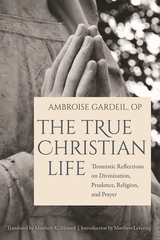
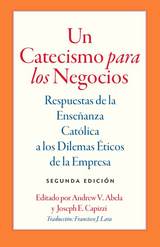

A concise introduction to Christian ethics, this book surveys the moral values of the Catholic tradition and applies them to contemporary issues. Prominent authors address such topics as scriptural sources, reverence for human life, sexuality and intimacy, family responsibilities, the concept of peace in the modern world, economics, and Catholic higher education.
Vision and Values is both an overview of the major perspectives which inform moral decisions and a guide to how these principles interrelate. It can help readers determine how to make complex moral judgments in a Christian context as it demonstrates the vitality of the Catholic theological tradition.
READERS
Browse our collection.
PUBLISHERS
See BiblioVault's publisher services.
STUDENT SERVICES
Files for college accessibility offices.
UChicago Accessibility Resources
home | accessibility | search | about | contact us
BiblioVault ® 2001 - 2024
The University of Chicago Press









